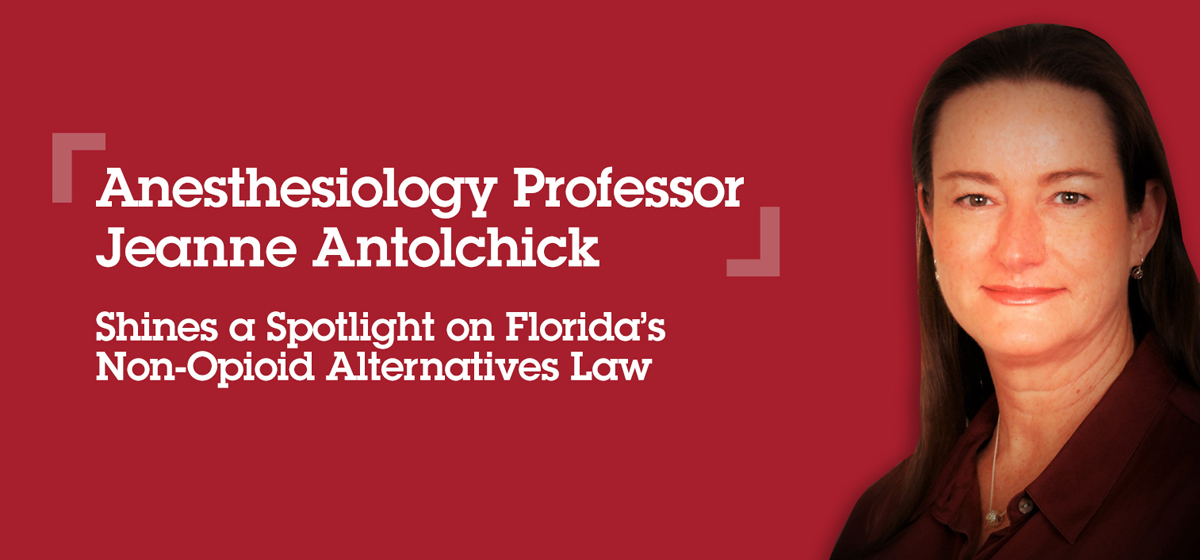In June 2019, Florida became the fifth state in the nation to adopt a law with the intent to mitigate the opioid epidemic. Florida’s law, in particular, requires that health care providers have a conversation about opioids and provide a pamphlet about alternatives to opioid medications to their patients before administering or prescribing an opioid. Barry University Professor of Anesthesiology, Jeanne Antolchick, Ph.D., APRN, CRNA, played an integral role in bringing it to fruition.
A U.S. Army veteran with a diverse clinical background, Antolchick has dedicated her career to shared decision-making between patients and their health care providers. Her work as a Certified Registered Nurse Anesthetist (CRNA) gave her crucial insight into the overuse of opioids. Similar to the manner in which misinformation about the dangers of cigarette smoking was once promoted by the tobacco companies, many health care providers and patients have been misinformed about the safety and efficacy of opioids. Antolchick became an advocate of non-opioid pain management, a position she promoted vigorously as a member of the board of directors of the Florida Association of Nurse Anesthetists (FANA). FANA is a professional organization representing more than 5,400 CRNAs, and, with Antolchick at the helm, it successfully lobbied for and helped pass the non-opioid alternatives bill. “Patients [now] have a right to request that no opioids are administered to them unless they choose,” says Antolchick. “A frank conversation with their healthcare provider will ensure that the best decision is made for that individual patient’s care.”
Last month, in honor of International Overdose Awareness Day, Antolchick penned an editorial for Florida Politics about the significance of the non-opioid alternatives law and the importance of empowering Floridians to make informed decisions about the medications and treatments they receive. Here, she shares more about the law and how it is working to give Floridians a voice.
Why was creating legislation around non-opioid alternatives for patients so important?
Many times, patients do not feel comfortable speaking with their health care providers about their concerns regarding their care. Perhaps they feel rushed. Perhaps they feel embarrassed. Perhaps they are afraid. Or perhaps, they are simply uneducated about the fact that there are many ways to manage both acute and chronic pain conditions that do not involve opioids.
And, sometimes, what is even worse, is that health care providers ignore or forget what their patients have told them. For example, a patient in recovery from opioid addiction may ask his or her health care provider to “not give me any opioids.” Perhaps that message does not get passed on to others who will take over the care of that patient. Or perhaps the health care provider doesn't believe that receiving even one dose of an opioid in the operating room while under general anesthesia can lead to a relapse. Some health care providers may not understand that opioids are not a necessary part of a pain management plan and alternative methods are indeed available. Regardless of the reason, the non-opioid alternatives law gives the patient a voice. And the voice is written down on paper so that no one can ignore or forget to follow the patient’s request.
What are some of the misconceptions around opioids and what does non-opioid pain management involve?
Preconceived notions about opioids include the following: opioids are necessary, opioids are beneficial, opioids are safe, and opioids effectively manage pain. These are not correct.
Non-opioid pain management techniques involve the elimination of opioids, which are replaced by multimodal agents that block the nociceptive (pain) pathway. Opioids are avoided to eliminate their many costly side effects including nausea, vomiting, constipation, ileus, urinary retention, somnolence, dysphoria, tolerance, dependence, abuse, addiction, opioid-induced hyperalgesia (OIH), respiratory depression, and opioid-induced ventilatory impairment.
You've held several leadership roles with FANA, including serving as director from 2016–2018and Secretary-Treasurer from 2018–2020. Why did FANA begin discussing the need for patients to have a choice regarding opioid administration?
I have been a proponent of non-opioid anesthesia and analgesia since I first learned about the technique(s) in January 2016 in my clinical practice as a CRNA. I was intrigued by the many stories in the newspapers about patients who became addicted to opioids following their initial exposure during surgery. In June of 2018, I informed the FANA board that I intended to pursue my personal goal of making Florida the 5th state in the nation to offer patients a choice whether or not to receive opioids during the course of their anesthetic. To my delight, the FANA board agreed to support my endeavor.
Even though the law is only a year old, have you been able to observe its impact yet?
I have been blessed with the opportunity to present non-opioid analgesia and anesthetic techniques at national and state venues to include both academic and professional conferences and community meetings. I often receive follow-up communication from audience members encouraging me to continue sharing the message to health care providers and patients. In addition, practicing CRNAs from around the state will send me screenshots of their electronic medical records indicating that they have spoken to their patients about non-opioid alternatives. We must eliminate the preconceived notions that opioids are necessary, that opioids are beneficial, that opioids are safe, and, that opioids effectively manage pain.

